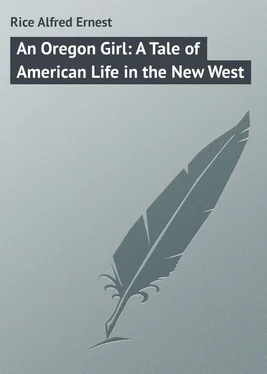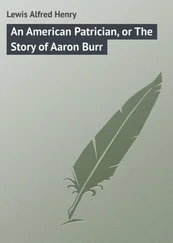Alfred Rice - An Oregon Girl - A Tale of American Life in the New West
Здесь есть возможность читать онлайн «Alfred Rice - An Oregon Girl - A Tale of American Life in the New West» — ознакомительный отрывок электронной книги совершенно бесплатно, а после прочтения отрывка купить полную версию. В некоторых случаях можно слушать аудио, скачать через торрент в формате fb2 и присутствует краткое содержание. Жанр: foreign_prose, foreign_adventure, на английском языке. Описание произведения, (предисловие) а так же отзывы посетителей доступны на портале библиотеки ЛибКат.
- Название:An Oregon Girl: A Tale of American Life in the New West
- Автор:
- Жанр:
- Год:неизвестен
- ISBN:нет данных
- Рейтинг книги:4 / 5. Голосов: 1
-
Избранное:Добавить в избранное
- Отзывы:
-
Ваша оценка:
- 80
- 1
- 2
- 3
- 4
- 5
An Oregon Girl: A Tale of American Life in the New West: краткое содержание, описание и аннотация
Предлагаем к чтению аннотацию, описание, краткое содержание или предисловие (зависит от того, что написал сам автор книги «An Oregon Girl: A Tale of American Life in the New West»). Если вы не нашли необходимую информацию о книге — напишите в комментариях, мы постараемся отыскать её.
An Oregon Girl: A Tale of American Life in the New West — читать онлайн ознакомительный отрывок
Ниже представлен текст книги, разбитый по страницам. Система сохранения места последней прочитанной страницы, позволяет с удобством читать онлайн бесплатно книгу «An Oregon Girl: A Tale of American Life in the New West», без необходимости каждый раз заново искать на чём Вы остановились. Поставьте закладку, и сможете в любой момент перейти на страницу, на которой закончили чтение.
Интервал:
Закладка:
The cunning fellow knew well how to touch the chord of sympathy that is ever present in the guileless heart of innocent childhood.
The response came in a wondering look of infinite tenderness and compassion, for the child did not clearly comprehend Jack’s request and she asked:
“Did you break your arm?”
“Eesa da hurt-a bad. Oh, oh!” he groaned, “get-a da bot’, da bot’-a, child; get-a da bot’.”
“Poor man! Shall I run for the doctor?”
“No, no, no, note-a da dock! Help-a me get-a da bot’ in-a da pock! Quick-a, deeze-a side. Put in-a da hand. Take eem out – oh, oh!”
Perceiving that he meant her to take something out of his pocket, on the right side of his coat, and not understanding the significance of the word “bot,” she drew near to thrust in her hand.
That instant Jack’s left arm encircled her form and his right hand clapped the saturated handkerchief over her mouth and nostrils and held her to him.
She struggled in his arms to free herself, but without avail.
As a feeling of stupor stole over her senses, Jack, still on his knees, watched her with the keenest of eyes, and muttered soothingly, “Eesa nice-a da girl. Nice-a da smell lak-a da dreamy Italy.”
Some rascals would have made short work of the matter, but Jack was by nature very tender and considerate of children, which accounted for his slow application of the powerful drug. It soon had her under its influence, and when she became limp and nerveless he laid her on the grass. Again he saturated the handkerchief and held it to her nostrils, and with distended, tragic eyes watched her doze into unconsciousness.
Feeling satisfied that she would not speedily recover, he let the handkerchief lie loose on her nostrils and mouth, then he arose to his feet and with the stealthy, catlike tread of an Indian, skulked from shadow to shadow until he had made a complete circuit of the spot.
Having assured himself that no one was in the vicinity, he swiftly turned and again fell on his knees beside the child.
He looked intently in her face and noted the sweet expression of childish innocence and trust in the repose. “She sleeps, beautiful child! As sweetly innocent and confiding as God ever inspired with the breath of life.”
Then from under his coat, where a hump appeared in the back, he drew out a grey woolen cloth about four feet square and folded it about the child, gathered her in his arms and arose to his feet.
“Mine, mine, though no harm shall come to you, pretty one! Twenty thousand dollars shall be the price of your liberty.”
And, keeping in the shadows and away from the lights as much as possible, he wended his way toward the river and soon became obscured in the distant gloom.
When John Thorpe, closely followed by Rutley, entered the great ballroom in search of Corway, the guests who saw him were struck with the pallor of his face and the strangely piercing yet lustreless dark eyes that shone out from beneath his shaggy, frowning eyebrows. His cold, stony look repelled all smiles and discouraged all questions. Through the room he strode, regardless alike of the timid whisperings of women and offended stare of men. He cared not what they thought, for every sentiment of rudeness or discourtesy, every tender feeling of grief or pain, was drowned by his one great mad, overpowering passion to wreak summary vengeance on the author of his bitter shame.
Not for a moment had he suspected “My Lord’s” integrity and utter disinterestedness, and the maddening fire of his disgrace kindled within him and fanned to a crucible heat by Rutley burned with unquenchable fury.
Men of the temperament of John Thorpe are not blessed with a stoical mind in moments of great excitement, nor are they apt to pause and tranquilly reason out the pros and cons of this most prolific source of human tragedies.
He had loved his wife too fondly and too well to go and openly charge her with unfaithfulness.
His life heretofore had been very happy, but now the first “damned spot” in the clear blue of his domestic horizon would not out, the feeling of suspicion would not smother. And it grew and enlarged with amazing rapidity, and haunted him till the very thought of Corway aroused his latent jealousy to a pitch that became unbearable. Rutley had developed the demon within him.
The love that had become a fixed part of his being, flooding him with its radiance, had been violently wrenched from his heart, and his only, all-absorbing, insatiable desire was to confront the man who was responsible for it.
Oh, for the frailty of human happiness!
Out near the steps of the east piazza a group of ladies and gentlemen, composed of Mr. and Mrs. Harris, Mr. Corway and Hazel were chatting merrily about the new waltz and incidentally they had referred to the prolonged absence of “My Lord” and John Thorpe from the ballroom. Mrs. Harris discovered them on the piazza approaching the steps and exclaimed, “Ah, here come the truants.”
Without a moment’s hesitation, John Thorpe descended the steps alone, Rutley remaining on the piazza.
“Mr. Harris,” said John Thorpe in a husky voice, “in the name of the society whom he contaminates, I demand that you eject that man from this place.”
This peremptory and extraordinary demand, coupled with its insinuation, stunned the hearers, who looked from one to the other in startled amazement.
The dead silence that followed was broken by Mr. Harris, who answered in a grave, dazed way, as thoughts of Thorpe’s sanity flitted through his brain, “But, Thorpe! I – what – I don’t think – my hearing is not exactly right of late. I did not understand – ”
Without removing his steady gaze from Corway, Mr. Thorpe reiterated his words slowly and with stinging accentuation, “I demand that you eject that man from this place,” and he pointed his finger dramatically at Corway, while glints of merciless intent shot from his eyes.
The red flushed into Mr. Harris’s face as he realized the indignity his guests and himself were being subjected to.
“Thorpe – John – you are insulting all of us. Mr. Corway is my guest. What is the meaning of this affront to my hospitality?”
“To defend my honor!” cried the distracted man, lost to all sense of propriety or decorum, “or to add my blood to the other crimes that disgrace him.”
“In the name of all that’s astounding, what do you mean, Thorpe?” exclaimed Corway.
“I mean that I intend to avenge the irreparable wrong I have suffered,” replied Mr. Thorpe, fairly hissing the words from between his teeth.
“Irreparable wrong! To whom do you refer?”
“To you, scoundrel! Tell how you came by that ring!”
Mr. Harris had listened to the two men with ill-concealed impatience, but when Mr. Thorpe called Mr. Corway, one of his guests, a scoundrel, and dangerous business appearing imminent, he could control his indignation no longer and shouted, “Mr. Thorpe’s carriage immediately! Here, Sam, your assistance. Wells, get some more help to maintain order.”
The words had scarcely been uttered, when Sam, who had appeared with Virginia on the piazza, sprang down the steps to his uncle’s assistance. They were quickly joined by the coachman and gardener who, having chanced to meet in a nearby secluded angle of the porch, had heard the loud, passionate words and were at once available for duty.
“Hold, Mr. Harris!” spoke up Corway, who seemed to be less disturbed than either Thorpe or his host, “don’t be hasty in this matter! Mr. Thorpe is certainly laboring under some delusion.”
“I will not listen to you,” replied Mr. Harris, now worked up to a fury. “Mr. Thorpe’s conduct is outrageous. Away with him to his carriage.”
“I guess so!” responded Sam, pulling off his coat and looking at his uncle sideways, “stampede the corral, eh, uncle? That’s what you want!”
Читать дальшеИнтервал:
Закладка:
Похожие книги на «An Oregon Girl: A Tale of American Life in the New West»
Представляем Вашему вниманию похожие книги на «An Oregon Girl: A Tale of American Life in the New West» списком для выбора. Мы отобрали схожую по названию и смыслу литературу в надежде предоставить читателям больше вариантов отыскать новые, интересные, ещё непрочитанные произведения.
Обсуждение, отзывы о книге «An Oregon Girl: A Tale of American Life in the New West» и просто собственные мнения читателей. Оставьте ваши комментарии, напишите, что Вы думаете о произведении, его смысле или главных героях. Укажите что конкретно понравилось, а что нет, и почему Вы так считаете.


![Ally Carter - [Gallagher Girls 01] I'd Tell You I Love You But Then I'd Have to Kill You](/books/262179/ally-carter-gallagher-girls-01-i-d-tell-you-i-lo-thumb.webp)









